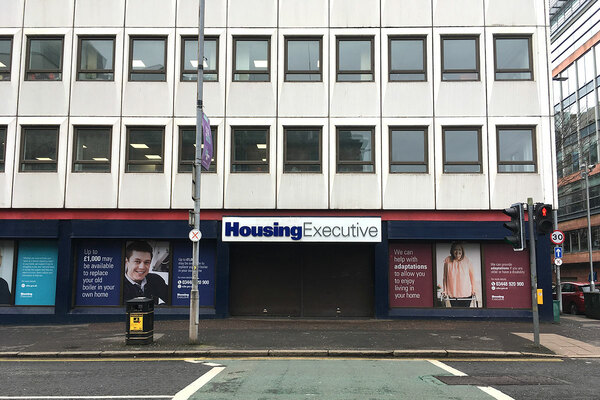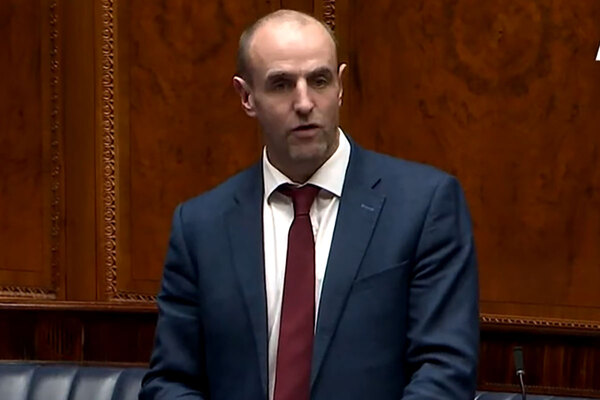You are viewing 1 of your 1 free articles
 Ben Collins
Ben CollinsMitigating welfare changes is chief on our list of concerns in Northern Ireland
Ben Collins, chief executive of the Northern Ireland Federation of Housing Associations (NIFHA), outlines some of the key issues NIFHA’s been lobbying about in the run-up to recent elections
In Northern Ireland the month of May has been bookended with local elections at the start and European elections at the end. We have also seen the resumption of the talks process with the aim of agreeing a way forward for the political parties to go back into government. The secretary of state for Northern Ireland and the Tánaiste have announced that these talks will now continue this month.
NIFHA has been meeting with each of the political parties to brief them on key housing issues that will need to be urgently addressed by a restored Northern Ireland Executive.
Chief among these are: welfare mitigations, proposed changes to services funded by the Supporting People programme, intimidation points and social housing allocations, the need for a multi-year development programme, and the potential of mixed-tenure development.
The current welfare mitigations are due to end in March 2020.
NIFHA is a member of the #CliffEdgeNI campaign working group. More than 70 organisations across Northern Ireland are calling for mitigations to be extended and updated to reflect changes introduced since the Fresh Start Agreement on mitigations.
“We have substantial concerns about recent proposals by the Northern Ireland Housing Executive to move towards a presumption of floating support, as there will always be a need for accommodation-based services for sheltered and supported housing”
From a housing perspective, it is crucial that the mitigations relating to the Social Sector Size Criteria (bedroom tax) and benefits cap are kept. According to the government’s estimates, 34,000 households (7,500 in housing association properties) will be affected by the loss of bedroom tax mitigation payments worth £22.1m per year. Around 1,500 households also face the loss of benefit cap mitigation payments worth £3.3m per year.
We continue to work with the other housing federations in Britain and the Department for Communities (DfC) to minimise the disruption caused by the introduction of Universal Credit. Because the roll-out in Northern Ireland was only completed last December, it’s too soon to quantify the effects on tenants here. But our staff is already reporting increased arrears and financial pressures on tenants.
We have substantial concerns about recent proposals by the Northern Ireland Housing Executive (NIHE) to move towards a presumption of floating support, as there will always be a need for accommodation-based services for sheltered and supported housing. The proposed move to greater usage of procurement for the provision of services raises the prospect of a race to the bottom, which will not provide the required level of services.
Funding for the Supporting People programme has been frozen for more a decade, with a 5% cut to accommodation-based services in the past year. Meanwhile, the need for such services and the costs of delivering them continue to grow as more people are living longer and developing more complex needs.
It should be remembered that for every £1 invested in Supporting People, it saves the wider public purse £1.90 (according to the Centre for Economic Empowerment report for NICVA on Supporting People).
We remain committed to working constructively with NIHE and DfC to deliver Supporting People in line with evolving needs. We cannot, however, support NIHE’s Supporting People Plan 2019-20 and Strategic Intent 2020-23 document as it stands because, in key aspects, it contradicts the 2015 ministerial review of Supporting People. We believe it is irresponsible to propose the continued commissioning of new services without having first identified sustainable funding for existing services.
To protect service users, we continue to seek the reversal of the 5% accommodation-based cuts and a funding uplift for existing services to offset inflationary pressures. Evolving the service is not an alternative to proper funding. We need clear and unambiguous line of sight on the future of accommodation-based services. There must be clarity on proposals for procurement vs Standardised Regional Payment Rates.
“We need clear and unambiguous line of sight on the future of accommodation-based services. There must be clarity on proposals for procurement vs Standardised Regional Payment Rates”
NIFHA also calls for the recommendations from the fundamental review of Social Housing Allocations to be fully implemented as soon as possible, with particular reference to intimidation points. We have engaged with DfC on this on several occasions. While they are keen to utilise their new powers under the secretary of state’s guidance to try to implement some of the recommendations, they have been clear that the intimidation points issue is not one of the issues they plan to address in this way.
The Social Housing Development Programme (SHDP) provides much-needed new homes. As a sector we have consistently met our targets but need is growing, as evidenced by a 20% increase of those in housing stress over the past five years. In addition, the SHDP is a significant driver for the local construction industry and provides a multiplier effect of circa £1bn per year for the regional economy.
We are pressing for a multi-year programme that would provide more flexibility for the housing association sector and create more certainty for contractors and others within the wider construction industry. It would also help cut costs by eliminating the constraints on planning and tendering caused by the current annual programme.
We are working with the Northern Ireland Local Government Association (NILGA) and local councils to encourage a mixed-tenure approach. While respecting the ability of local councils to specify levels of social and affordable housing within their new local development plans, we believe that there should be a minimum requirement for each council area, set by an incoming Northern Ireland Executive. This would help to ensure that we can continue to provide quality homes for those in housing stress.
We are very encouraged by the positive responses we’ve received during our meetings so far. Over the coming weeks, we will continue to brief political parties and argue for these necessary changes. As the parties consider what to include in a new Programme for Government, we will maintain our focus on ensuring that housing is among their top priorities.
Ben Collins, chief executive, NIFHA











